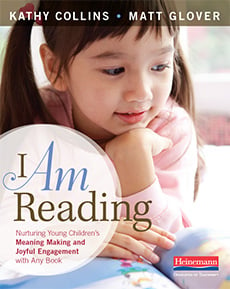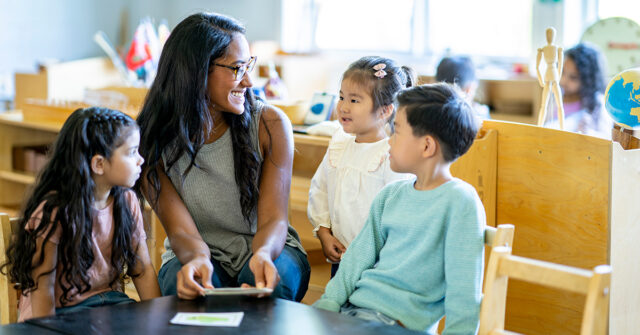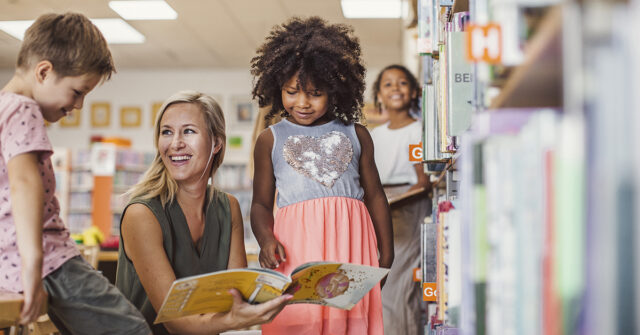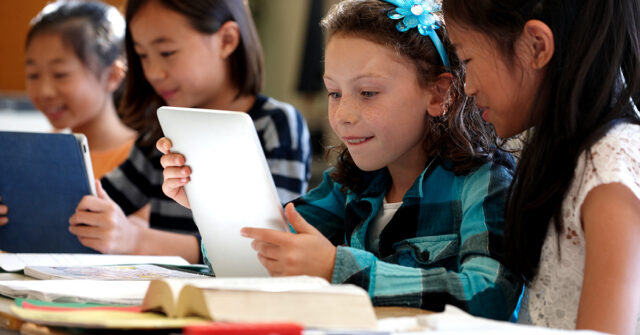
Adapted from I Am Reading: Nurturing Young Children’s Meaning Making and Joyful Engagement with Any Book by Kathy Collins and Matt Glover
Although most young children have some experience rereading well-loved, favorite books, either at home or in school, it is less common for them to independently pick out and stick with a book that is unknown or unfamiliar. We’ve watched children in pre-K classrooms rummage through a basket containing familiar and unfamiliar books. Most often, the children flip right past texts they’ve never seen before to get to Brown Bear, Brown Bear, What Do You See? or the well-loved version of The Three Little Pigs with the taped-up pages.
We begin with the premise that reading unfamiliar books at home or at school activates a very different kind of thinking on the part of the child. When kids pick up a book they’ve never seen or heard before, they don’t have any prior experience with that text to rely upon. They can’t recall (or, therefore, mimic) their mother’s voice when she reads a particular page. They don’t have their dad’s explanation of what’s happening in a certain part and so they can’t then use that prior knowledge to anchor them to the text. They don’t have an experience of listening to their teacher read it aloud to them. They don’t have the security of knowing a repeated refrain that helps them hold on to the story across pages.
When a child reads an unknown book for the first time, she is called upon to imagine and invent what is happening on each page. It requires a deeper level of attention to illustrations and details within and across pages. It requires self-reliant inferring in which she integrates the information on the page and across pages with her own experiences and knowledge. It requires the child to call upon her language stores.
When children actively choose to read unknown texts and feel empowered to do so, their image of themselves as readers and their vision of reading are expanded. They become more confident, more willing, and more able to interact with any text, regardless of whether it is known or unknown.
As we consider the work that children do as they read unfamiliar texts, we have to keep in mind that the act of reading is made up of much more than just decoding the words on the page even though so much of the instructional focus and adult concern for our youngest readers is about getting them to decode. Although this is certainly an obvious and important part of becoming a well-rounded reader, a narrowly centered focus on teaching young children to decode at the expense of other kinds of experiences with texts may actually strip away their very early sense of agency (Johnston 2004) and comfort with books.
However, if we expand our own view of early reading to include all the work children do before they’re reading conventionally, we see so much more than a young child not yet reading the words on a page. We see intention and purpose. We see problem-solving and resourcefulness. We see meaning making and the development of a healthy reading identity. With this expansive view of what it means to be a reader, we are more likely to observe, value, support, and extend what children do as readers before they start to decode words.
Still, we want to be clear: we’re not deemphasizing the importance of teaching children to be skillful word-solvers and proficient decoders, nor are we suggesting that we withhold that instruction if a child is clearly ready and waiting for it. Instead, we are suggesting that it’s also worth prioritizing young children’s comprehension, meaning making, and thinking work in all kinds of texts, including unfamiliar books. Providing young children with lots of opportunities and encouragement to read unfamiliar books, in addition to the ones they know so well and love so much, helps them to become adventurous, confident readers who are highly engaged meaning-makers.
Learn more about I Am Reading: Nurturing Young Children’s Meaning Making and Joyful Engagement with Any Book
Explore additional Reading instruction resources here.

Matt Glover has been a teacher, principal, and consultant for over 30 years. He is the author and coauthor of many Heinemann titles including I Am Reading; Engaging Young Writers; Projecting Possibilities for Writers; Already Ready; and Watch Katie and Matt…Sit Down and Teach Up, a video- enhanced e-book. Matt was also coeditor with Ellin Oliver Keene of a best-selling collection of essays, The Teacher You Want to Be. An international literacy consultant, Matt frequently speaks on topics related to nurturing writers of all ages, early reading, and supporting children’s intellectual development.

Kathy Collins is coauthor with Matt Glover of the Heinemann title I Am Reading. Kathy is the beloved author of Growing Readers as well as Reading for Real. She presents at conferences and works in schools all over the world to support teachers in developing high-quality, effective literacy instruction in the elementary school grades. Kathy has worked closely with the Teachers College Reading and Writing Project at Columbia University, and she was a first grade teacher in Brooklyn, New York.



